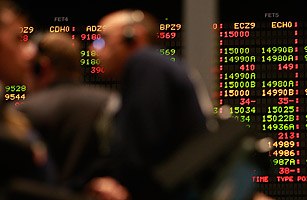
A popular refrain in the crisis aftermath has been that the system didn't almost collapse because firms were too big, but because they were too interconnected. One major way in which that happens is through derivatives, contracts that companies buy and sell as a way to hedge their risk against future events, such as a spike in interest rates. Simpler derivatives, like the ones used by farmers to financially insulate themselves against the effects of bad weather on their crops, have been regulated and traded on exchanges for decades.
But because of a law passed by Congress in 2000, more complex derivatives, like the subprime-mortgage-related ones that led to AIG's $182 billion taxpayer bailout, aren't regulated or traded. Under the current system, no one — including regulators, the firms writing the contracts or the ones buying and trading them — can see what's going on in the market. Both the House and Senate bill would change that by making derivatives exchange-traded and funneled through a centralized clearinghouse. That transparency would help identify any brewing problems and force firms to prove they have the money to make good on their contracts. As a result, it would make speculative trading much less profitable. A separate bill in the Senate, which could get wrapped into the main financial reform legislation, goes even farther and prohibits deposit-taking institutions from engaging in derivatives trading at all.
How effective such an exchange would be largely depends on how many exemptions from it are allowed. The House bill allows end-users of derivatives — such as airlines hedging oil prices — to continue to use the current system so that they don't have to constantly post collateral on their contracts. The problem would come if too many firms — including, possibly, speculative traders with token end-user outfits — gain similar exemptions.